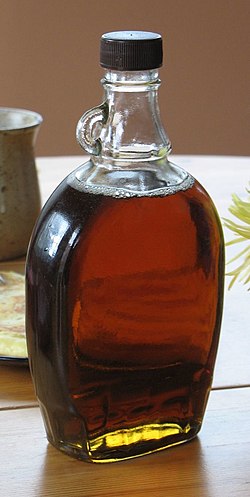Maple
A comprehensive overview of Maple syrup, its production, and uses
Maple Syrup[edit]

Maple syrup is a sweet, viscous liquid made from the sap of certain species of maple trees, primarily the sugar maple (Acer saccharum), red maple (Acer rubrum), and black maple (Acer nigrum). It is a popular natural sweetener used in a variety of culinary applications.
History[edit]
The production of maple syrup is a practice that dates back to the indigenous peoples of North America. They developed methods to harvest and process the sap of maple trees into syrup and sugar. European settlers adopted these techniques and refined them over time.
Production[edit]
The process of making maple syrup involves tapping maple trees to collect their sap. This is typically done in the early spring when temperatures fluctuate between freezing at night and thawing during the day. The collected sap is then boiled to evaporate water, concentrating the sugars to produce syrup.
Tapping[edit]
Tapping involves drilling a small hole into the trunk of a maple tree and inserting a spout, known as a spile, to allow the sap to flow out. The sap is collected in buckets or through tubing systems that transport it to a central location for processing.
Boiling[edit]
The sap is boiled in large evaporators, where the water content is reduced, and the sugars are concentrated. This process requires careful monitoring to ensure the syrup reaches the correct density and sugar content.
Grades and Classification[edit]
Maple syrup is graded based on its color and flavor. In the United States, the grading system includes:
- Grade A: Light Amber, Medium Amber, Dark Amber
- Grade B: Darker and more robust in flavor
In Canada, the grading system is similar but uses different terminology, such as "Golden," "Amber," "Dark," and "Very Dark."
Uses[edit]
Maple syrup is commonly used as a topping for pancakes, waffles, and French toast. It is also used as a sweetener in baking, cooking, and as a flavoring agent in various dishes.
Nutritional Information[edit]
Maple syrup contains a variety of nutrients, including manganese, riboflavin, zinc, and calcium. It is also a source of antioxidants. However, it is high in sugar and should be consumed in moderation.
Cultural Significance[edit]
Maple syrup is an integral part of the cultural heritage of regions in North America, particularly in Canada and the northeastern United States. It is celebrated in festivals and is a symbol of Canadian identity.
Related pages[edit]
-
Maple
-
Maple
-
Maple
-
Maple
-
Maple
-
Maple
-
Maple
-
Maple
-
Maple
-
Maple
-
Maple
-
Maple
Ad. Transform your life with W8MD's Budget GLP-1 injections from $75


W8MD offers a medical weight loss program to lose weight in Philadelphia. Our physician-supervised medical weight loss provides:
- Weight loss injections in NYC (generic and brand names):
- Zepbound / Mounjaro, Wegovy / Ozempic, Saxenda
- Most insurances accepted or discounted self-pay rates. We will obtain insurance prior authorizations if needed.
- Generic GLP1 weight loss injections from $75 for the starting dose.
- Also offer prescription weight loss medications including Phentermine, Qsymia, Diethylpropion, Contrave etc.
NYC weight loss doctor appointmentsNYC weight loss doctor appointments
Start your NYC weight loss journey today at our NYC medical weight loss and Philadelphia medical weight loss clinics.
- Call 718-946-5500 to lose weight in NYC or for medical weight loss in Philadelphia 215-676-2334.
- Tags:NYC medical weight loss, Philadelphia lose weight Zepbound NYC, Budget GLP1 weight loss injections, Wegovy Philadelphia, Wegovy NYC, Philadelphia medical weight loss, Brookly weight loss and Wegovy NYC
|
WikiMD's Wellness Encyclopedia |
| Let Food Be Thy Medicine Medicine Thy Food - Hippocrates |
Medical Disclaimer: WikiMD is not a substitute for professional medical advice. The information on WikiMD is provided as an information resource only, may be incorrect, outdated or misleading, and is not to be used or relied on for any diagnostic or treatment purposes. Please consult your health care provider before making any healthcare decisions or for guidance about a specific medical condition. WikiMD expressly disclaims responsibility, and shall have no liability, for any damages, loss, injury, or liability whatsoever suffered as a result of your reliance on the information contained in this site. By visiting this site you agree to the foregoing terms and conditions, which may from time to time be changed or supplemented by WikiMD. If you do not agree to the foregoing terms and conditions, you should not enter or use this site. See full disclaimer.
Credits:Most images are courtesy of Wikimedia commons, and templates, categories Wikipedia, licensed under CC BY SA or similar.
Translate this page: - East Asian
中文,
日本,
한국어,
South Asian
हिन्दी,
தமிழ்,
తెలుగు,
Urdu,
ಕನ್ನಡ,
Southeast Asian
Indonesian,
Vietnamese,
Thai,
မြန်မာဘာသာ,
বাংলা
European
español,
Deutsch,
français,
Greek,
português do Brasil,
polski,
română,
русский,
Nederlands,
norsk,
svenska,
suomi,
Italian
Middle Eastern & African
عربى,
Turkish,
Persian,
Hebrew,
Afrikaans,
isiZulu,
Kiswahili,
Other
Bulgarian,
Hungarian,
Czech,
Swedish,
മലയാളം,
मराठी,
ਪੰਜਾਬੀ,
ગુજરાતી,
Portuguese,
Ukrainian










